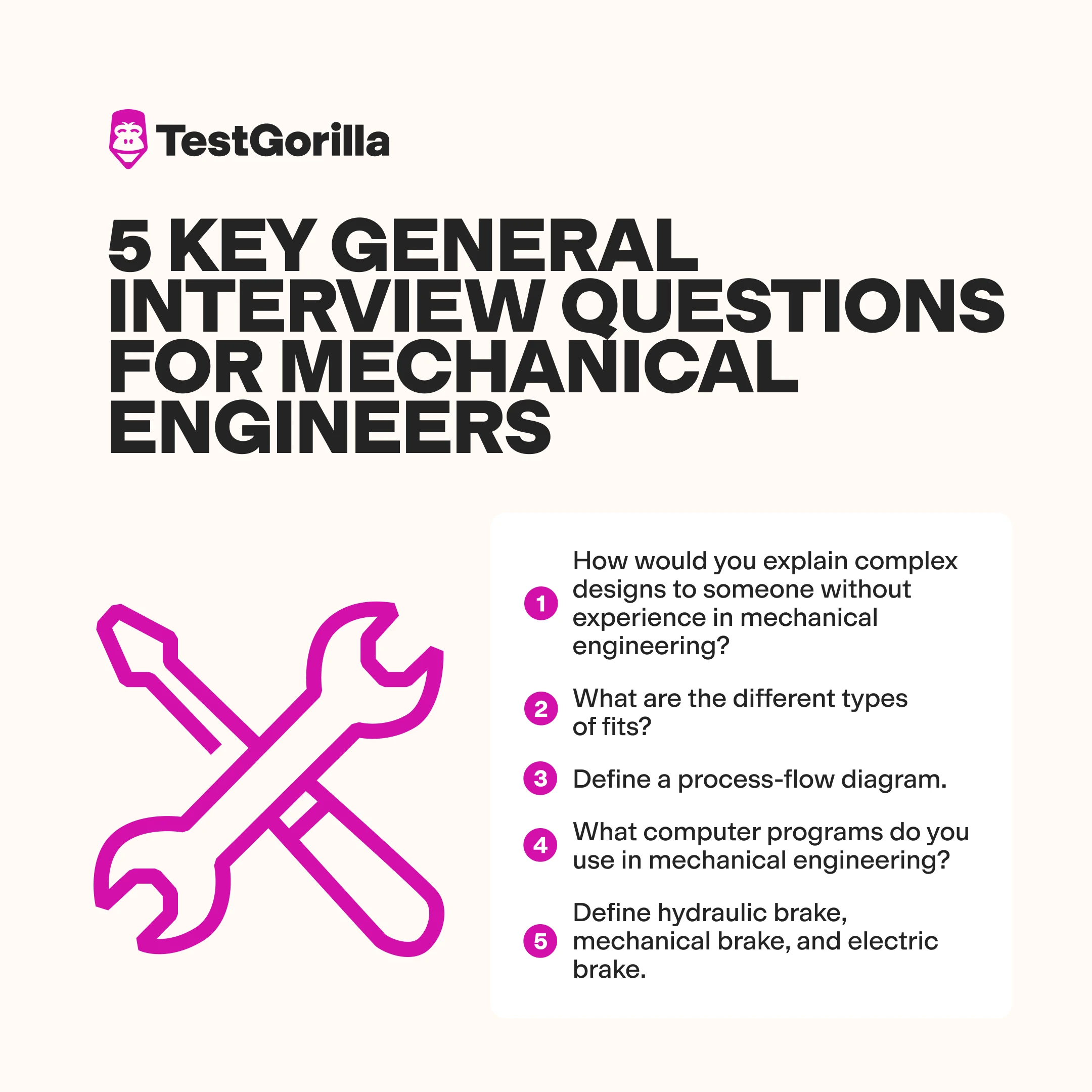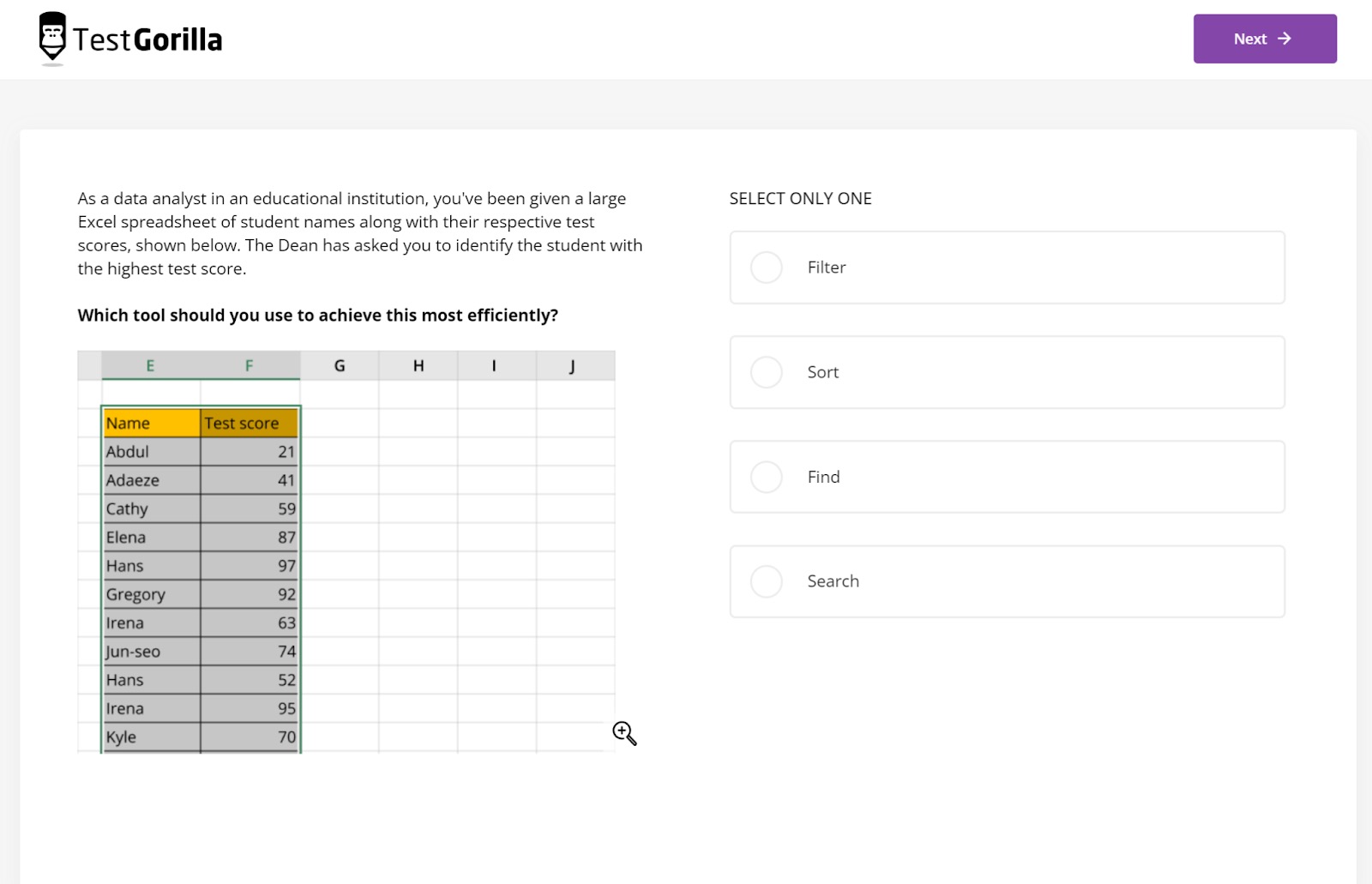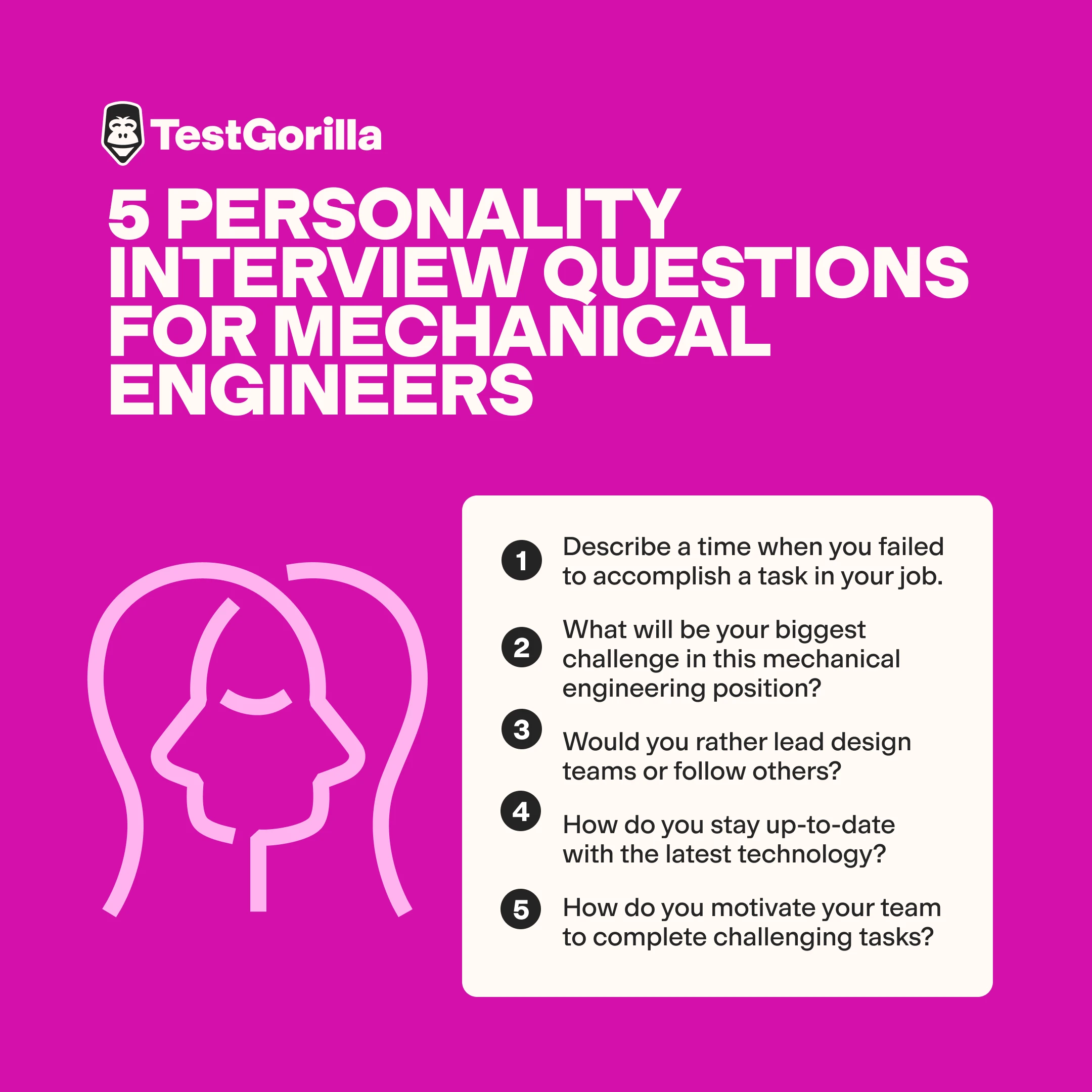70 interview questions for mechanical engineers
Make better hires and find skilled mechanical engineers using TestGorilla
To hire a mechanical engineer, you have to ask the right questions that will enable you to learn as much as possible about their skills and knowledge. Mechanical engineering is a challenging industry that requires mathematical intelligence, creative skills, and technical expertise.
One way to better understand your candidates’ knowledge is to use assessments such as the Mechanical Reasoning test. The test requires candidates to answer questions based on their knowledge of physics and mechanics.
Another crucial part of assessing applicants is the interview stage. But what questions should you ask?
Discover 70 interview questions for mechanical engineering roles, with sample answers to help you hire the right person.
Table of contents
- 26 general interview questions for mechanical engineers
- 5 sample answers to general interview questions for mechanical engineers
- 20 behavioral interview questions to learn more about mechanical engineers
- 5 sample answers to behavioral interview questions for mechanical engineers
- 24 personality interview questions for mechanical engineers
- 5 sample answers to personality interview questions for mechanical engineers
- When should you use skill assessments in your hiring process?
- Use our interview questions and skill tests to hire talented mechanical engineers
26 general interview questions for mechanical engineers
Check out these 26 common interview questions for mechanical engineer roles to better understand your candidates’ knowledge, skills, and work experience in engineering.
1. How did you decide to go into mechanical engineering?
2. Talk about your first engineering design.
3. What skills do you think a mechanical engineer should have?
4. How would you explain complex designs to someone without experience in mechanical engineering?
5. What are the different types of fits?
6. What do you do to improve your engineering skills?
7. Define a process-flow diagram.
8. How do hydraulics work on a machine?
9. What is the difference between a strut and a column?
10. What is the second law of thermodynamics?
11. Explain the difference between a tube and a pipe.
12. What elements do you need to increase the corrosion resistance of steel?
13. What computer programs do you use in mechanical engineering?
14. What are the different types of springs?
15. Do you have experience with using torque?
16. Explain the advantages of cycloidal and involute gears.
17. Define hydraulic brake, mechanical brake, and electric brake.
18. Can you give examples of some of the guidelines for designing castings?
19. What is a universal coupling? How do you use it?
20. Do you prefer to use pneumatics to control machinery or another method?
21. What is mechanical refrigeration?
22. What is the difference between metal and non-metal materials?
23. Describe the similarities between strain and stress.
24. What does a greenfield project mean?
25. What is meant by pitting?
26. Can you explain what coal is?
5 sample answers to general interview questions for mechanical engineers
Use these sample answers to five of the common mechanical engineer interview questions when assessing applicants’ responses.
1. How would you explain complex designs to someone without experience in mechanical engineering?
Candidates should talk about their communication skills and ability to describe engineering designs when answering this question.
For example, they might use images or videos to explain cycloidal and involute gears. Candidates should be able to strike a balance between simplifying terms and being direct in their explanation.
Send candidates a Communication test to better assess their verbal and non-verbal communication skills and professional etiquette. According to research, 68% of employees say they’ve wasted time because of inefficient communication, so hiring someone who can express their ideas clearly is essential.
2. What are the different types of fits?
The ideal candidate will know what mechanical fits are. They should get a bonus point if they explain each fit and how it works in the context of engineering work. You can also compare their answers after they have completed the Mechanical Reasoning test.
Below are the different types of fits in mechanical engineering:
Clearance fit: The air space or clearance between two shafts is called clearance fit. This fit allows more free movement when bolts and shaft holes slide freely without obstruction.
Interference fit: Engineers use interference to fit two mated parts, meaning there will always be an overlap in the joints. You can do this by pushing two components together with force.
Transition fit: A transition fit falls between clearance and interference. The tolerance zone of the shaft has to align with the other mating parts. This fit is usually smaller compared to interference.
3. Define a process-flow diagram.
A process-flow diagram (PFD) is a flowchart that shows the relationships between equipment, plant processes, and other significant components at an industrial plant. Mechanical engineers can use this diagram to improve a process or create a new one, improving quality control and efficiency.
4. What computer programs do you use in mechanical engineering?
Strong candidates will be familiar with the most popular software tools used in engineering. They could provide examples of software that has helped them to complete specific tasks.
For instance, mechanical engineers can use programs such as Solid Edge to create 3D designs, while MATLAB focuses on equations and mathematical analysis of chemicals or materials.
However, not all projects require using complex computer programs. Some candidates might prefer to use Microsoft Excel when documenting projects, for example.
Use a Microsoft Excel test (preview below) to better understand your candidates’ technical skills and ability to perform basic calculations. This way, you can also determine whether they require any additional training when they join the company.
5. Define hydraulic brake, mechanical brake, and electric brake.
Mechanical engineers will often need to make use of brakes in their roles. Therefore, candidates should know what they are and how they may use them:
Hydraulic: This brake uses a special type of hydraulic fluid to move pressure from the controlling mechanism to the brake controls. You can find these breaks in automobiles or light trucks.
Mechanical: Engineers use mechanical brakes the most because they dissipate kinetic energy to slow or stop machinery and wheels. The sudden friction ensures there is no more force in the brake.
Electric: These electromagnetic brakes use a rapid electrical current to stop the rotation of moving parts. Using mechanical resistance, this brake can be used in hybrid and electric vehicles.
Companies need to hire professionals who have enough experience and knowledge of how to use different components in their work, such as breaks.
The best insights on HR and recruitment, delivered to your inbox.
Biweekly updates. No spam. Unsubscribe any time.
20 behavioral interview questions to learn more about mechanical engineers
Below are 20 behavioral interview questions for mechanical engineer applicants. Choose a few questions to learn more about your candidates’ engineering mindset and processes.
1. Tell me about a time you disagreed with a team member. How did you resolve the conflict?
2. How do you check a project for flaws?
3. What is your approach to changing deadlines? How does this affect your work?
4. You join a multidisciplinary team but they don’t trust your judgment. What do you do?
5. How do you prioritize projects under pressure?
6. Describe a time you went above and beyond to finish a design.
7. How do you maintain professional relationships with stakeholders?
8. How would you calculate the power of a machine?
9. Can you provide an example of when you had to optimize a mechanical design to meet weight and strength requirements?
10. How do you troubleshoot and solve problems with a mechanical system?
11. Tell me about a time you worked with a team to design something from scratch.
12. How do you respond to negative feedback?
13. How do you provide feedback to other team members?
14. You have two projects that are due on the same day. What do you do?
15. Describe a time you used problem-solving skills to figure out a design problem.
16. What practices do you follow to catch any errors in your work?
17. Explain a written technical report or presentation you had to complete.
18. Do you often take the lead in projects?
19. Give an example of a mechanical design flaw you found during testing. How did you fix it?
20. If an engineer injures themself at work, what steps should you follow?
5 sample answers to behavioral interview questions for mechanical engineers
Review these sample answers to some of the behavioral interview questions above to hire the right candidate. Every response will be unique, but it should still include relevant facts and personal examples.
1. Tell me about a time you disagreed with a team member. How did you resolve the conflict?
Team members are bound to experience conflict, especially in demanding jobs. New research has discovered that over 36% of employees face disagreements regularly. Therefore, your candidates must have the skills and patience to resolve conflict professionally.
For example, the candidate may choose to set up a meeting with the other party to explain their reasoning and work on finding a solution together. To handle conflict situations, all team members should communicate frequently and know how to give and receive feedback.
Send candidates a Problem-solving test to see how they respond to challenging situations in the workplace.
2. What is your approach to changing deadlines? How does this affect your work?
In the engineering industry, deadlines can change incredibly quickly. Some factors that cause these changes include resource delays or weather conditions. Candidates should have the right approach when it comes to tight or challenging deadlines.
Some candidates might drop unnecessary tasks to meet the deadline, while others may create a comprehensive to-do list to avoid getting overwhelmed. There isn’t a right or wrong answer, but you should make a note of what each candidate says during their interviews.
Use a Time Management test to determine how well candidates prioritize, plan, and execute projects in mechanical engineering.
3. Can you provide an example of when you had to optimize a mechanical design to meet weight and strength requirements?
Experienced candidates can prove their expertise with weight and strength management by providing a relevant example. They should explain previous designs and how they collaborated with team members to meet project requirements.
For example, they could talk about the creation of a robotic arm for new machinery. In this case, they may have had to use light materials to design an arm that could move heavy objects around the manufacturing facility, incorporating essential principles of robotics engineering.
Through their design process, they might have met the necessary strength and weight conditions, while getting creative ideas from other team members.
It’s worth using a Critical Thinking test to assess your applicants’ capacity to analyze information. This test will determine which candidates can solve complex problems and use creativity to devise new approaches.
4. Tell me about a time you worked with a team to design something from scratch.
For this question, candidates should give an answer that shows their communication, teamwork, and creativity skills. They might discuss their work in a previous job and how it expanded their knowledge of mechanical engineering.
Statistics show that 89% of employees say creativity helps them achieve business objectives, so hiring a candidate who is able to come up with innovative strategies is essential.
A strong example will include enough information about the main goal and the process.
For instance, applicants might have worked as a team to design the technical components and create an automated testing system. Building something from scratch requires plenty of teamwork and consistent communication.
5. What practices do you follow to catch any errors in your work?
Everyone has their unique process when it comes to identifying errors. The ideal candidate will explain how they catch errors in mechanical designs and prevent them from happening again.
You could also test their attention to detail by giving them visual designs with inconsistencies and mistakes. Those who notice the errors quickly may have more experience with designs and quality control.
Send candidates an Attention to Detail (Visual) test to see whether they’re able to catch visual errors and notice small details.
24 personality interview questions for mechanical engineers
Here are 24 personality interview questions for mechanical engineer candidates. Use these questions to learn more about their behavior and career goals.
1. Do you prefer to work independently or in a team?
2. What is your least favorite task in the role of a mechanical engineer?
3. Describe a time when you failed to accomplish a task in your job.
4. How do you stay up-to-date with the latest technology?
5. What is your most successful engineering project?
6. What will be your biggest challenge in this mechanical engineering position?
7. Where do you see yourself in five years?
8. What is the first thing you designed on your own?
9. How do you set personal development goals?
10. What is the best way of learning from your mistakes?
11. How do you motivate your team to complete challenging tasks?
12. Why do you want to be a mechanical engineer for our company?
13. What inspires you to work in the engineering industry?
14. Have you ever taken online courses? Would you consider it?
15. Describe the steps you take when developing plans for a project.
16. Who was your go-to person when you encountered a problem on a design project?
17. What do you do when you face an angry client?
18. What are some unique ways of documenting your tasks?
19. Which traits make you a stronger mechanical engineer?
20. What steps do you take to maintain a safe work environment?
21. Would you rather lead design teams or follow others?
22. Share an example of how you have applied your skills to on-site work.
23. What is your most significant weakness as an engineer?
24. How has your education prepared you for this career?
5 sample answers to personality interview questions for mechanical engineers
Refer to these sample answers to evaluate the candidates’ responses when choosing someone for your mechanical engineering role.
1. Describe a time when you failed to accomplish a task in your job.
There will be times candidates have failed to complete a specific task. However, the key to assessing your applicants’ responses is to focus on how they learned from the challenge rather than on their struggles.
For example, candidates might discuss their experience with meeting project requirements. As they respond, note how they fixed the mistake or found ways to complete projects without compromising on weight and strength requirements.
You can also use a Big 5 (OCEAN) personality test to evaluate how the applicants’ traits could help them handle their mechanical engineer duties and challenges.
2. What will be your biggest challenge in this mechanical engineering position?
Every candidate will have fears or concerns about accepting a new role. They might have previously faced specific challenges in mechanical engineering that make it hard for them to remain confident.
Research suggests that employees are concerned about limited growth opportunities or not being able to develop their skills in a demanding job. Applicants might share similar concerns.
You can note down their responses to better understand their weaknesses, strengths, and personal concerns. Be wary of candidates who don’t express any worries – they may not be completely honest during the interview.
3. Would you rather lead design teams or follow others?
This question will help you determine whether the candidate is a potential leader. Some candidates have natural leadership capabilities when it comes to teamwork. They might want to delegate tasks and support those who are new or struggling.
Candidates who prefer to follow are also just as valuable. Followers tend to be open-minded and have strong communication skills. Selecting a candidate will depend on who you’d want to join your team, how they could contribute to upcoming design projects, and which applicants match your company’s mission and vision.
Consider sending candidates a Leadership and People Management test to evaluate their leadership skills and ability to guide others at the job.
4. How do you stay up-to-date with the latest technology?
Since mechanical engineering focuses on technology, it’s essential that candidates have experience with mechanical power machines and engineering products. They should monitor recent technological advancements and how they might change or benefit the industry.
Some ways of staying up-to-date with technology are to:
Read news from reputable sources (including blogs or specialized websites)
Join social events and tech conferences
Review the latest mechanical engineering job descriptions
Use Google trends
Find updated research reports on technology
Sign up for relevant newsletters
Connect with other professionals in their field
Follow tech leaders on social media
5. How do you motivate your team to complete challenging tasks?
Mechanical engineering can be a very demanding industry.
For example, designing intricate blueprints for the manufacturing of complex machines is an especially challenging task. There may be times when team members struggle to complete their duties. The ideal candidate will know exactly how to motivate them and provide support.
Only 32% of US employees feel engaged in their work. To increase this percentage, hire candidates motivated to succeed and grow.
A Motivation test can tell you more about a candidate’s personality traits. Hiring determined mechanical engineers is key to building a positive work culture and maintaining employee motivation.
Use TestGorilla's Motivation test with our Free plan.
When should you use skill assessments in your hiring process?
You should use skill assessments before conducting your interviews. These tests can help you identify talented professionals with the right skills and knowledge to perform their duties.
When they complete an assessment, candidates have to answer questions related to their current skills, level of expertise, or values and mindset.
For example, you may use a 16 Types personality test to better understand their behavior and mindset. To evaluate their cognitive function, use assessments such as the Understanding Instructions test.
Once your candidates complete each test, you can compare their answers. These data-driven results are key to recognizing skilled mechanical engineers.
Use our interview questions and skill tests to hire talented mechanical engineers
Now that you have a wide set of interview questions you could use, it’s time to find the best skill tests.
Search our test library to discover assessments related to cognitive function, personality, situational judgment, programming, and more. These tests can help you objectively assess candidates and quickly shortlist the best.
For more guidance, sign up for a free 30-minute live demo. Our team can suggest relevant skill tests that can enhance your hiring process. With extra support, you won’t have to spend long choosing and interviewing job applicants.
Are you ready to find a skilled mechanical engineer? Use our comprehensive skill assessments and interview questions to hire the best.
You've scrolled this far
Why not try TestGorilla for free, and see what happens when you put skills first.























